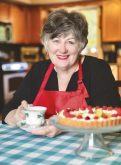With strong interest from the public in knowing more about where their food comes from, some farms are offering on-farm cooking classes.
This past year Thames River Melons near Innerkip, Ont., began offering a Harvest Brunch Experience that is part tour, part workshop, part cooking class and part meal. “It is very interactive and is done in small groups so it’s very personal as well,” says Alex Chesney, a registered dietitian who manages the on-farm market at her family farm.
Like many farmers, Chesney sees a big need for more education on where our food comes from, and the Harvest Brunch Experience allows her to tie lessons about that to practical hands-on food skills for a full-circle experience.
Read Also

Farm & Family – Feb 27 edition
Last week, we highlighted part one of a two-part series by GFM associate digital editor Geralyn Wichers about why you…
Nutrition and agricultural information are woven into the experience along with personal stories about the farm, the family and the community.
“I want people to experience agriculture and food first-hand,” says Chesney. “The brunch allows a very immersive version of that.”

The Harvest Brunch Experience is the latest of the many innovations on the farm that began in 1984 when Chesney’s father Rob diversified with an acre of melons. Today, the Chesney family sells many kinds of produce at their on-farm market, at off-farm markets, through grocery stores and through a Market Box delivery program.
In 2021, they added a kitchen to the on-farm market which allows them to extend their season. “We can freeze fruits and vegetables when they are in season and then use them to bake and cook with later. This is particularly helpful during our spring and winter shoulder seasons,” says Chesney.
In time they also hope to expand their experiential offerings by adding a Harvest Dinner, for example.
The Chesneys had originally hoped to install the kitchen in 2020 but the pandemic delayed the project until 2021. Then, with indoor activities restricted in 2021, they didn’t actually launch the Harvest Brunch until 2022. Chesney says they used the extra time to fine-tune the Harvest Brunch Experience by doing formal test runs and taking photos and videos for marketing materials.
Chesney shares the lessons she has learned following the launch of this latest venture for their farm:
- Consider your audience’s perspective. Food creates connections and creating tourism activities that incorporate education and learning are in demand. “Things that are normal and everyday for us are exciting and novel to those from different backgrounds. Storytelling is powerful and your story matters!”
- Focus on something you’re good at and enjoy doing.
- Figure out an accurate price for what it costs to host a class. “Don’t undervalue your time, experience and knowledge.”
- Partner with other tourism operations and local businesses to help round out your experience. The Chesneys have a table stocked with pamphlets advertising other activities in the area and they know that other farm and food destinations do the same for them.
- Check out your local tourism board. “They are such a great resource!”

In 2010, chef Cynthia Peters had a dream of starting a cooking school like those she’d visited in Europe. In food schools there, chefs would take her to visit local farms and farmers markets, followed by a trip back to the kitchen to prepare what they’d bought.
That dream became a reality when she purchased property in Prince Edward County, east of Toronto, and launched From the Farm Cooking School. Her focus: using quality local ingredients augmented with ingredients from other parts of the world.
The relationship with the local community was an integral part of the school, and promoting local farmers, bakeries and wineries was good for her business too.
With the growing interest in local food and experiential tourism, Peters grew the cooking school into a thriving concern. She got a lot of repeat business from people who had previously attended her classes and through word of mouth.
Although not a farmer herself, there is much that any farmer who is considering diversifying into cooking classes can learn from Peters’ dozen years running her cooking school. She generously shared several tips in a phone interview.
It’s important to find your unique path. What is the concept? It’s like having a cooking show. You need to have stories and tips to engage people.
Think about it from the audience’s perspective too. Most of all, participants, enjoy themselves and not be stressed. “It should look seamless. I want them to go home and tell people about it.”
For her, the opportunity to get hands-on is essential. Remember, Peters says, YouTube is full of videos, so aim to create memories a computer can’t.
Choose your class size carefully. The more people you have in a class, the harder it will be to have everyone finish at the same time so they can eat together.
If you are not a natural presenter, it’s important to practice. “Start with family and friends. Build your confidence.” Alternatively, you could hire someone who does know how to teach.
The space that you’re teaching in needs to be comfortable, interesting, and with sufficient space and the proper equipment.
Find out what regulations apply to the business including health regulations and municipal zoning restrictions. Peters points out that there can be differences between demonstrations and hands-on classes when it comes to health regulations.
Keep it fresh. Peters says it’s important for both the chef and the participants to have variety in the curriculum.
With social media today, it’s really important to consistently deliver a positive and fun experience.
For Peters, who had 25 years’ experience in marketing before starting the cooking school, marketing is second nature. However, she has noticed those with less marketing experience often find this part of the business to be very challenging.
Also keep some options open. Peters wanted a new adventure in 2020 and she’s finding it with a new venue to be called Maison Maitland in an 1820s stone mansion on the banks of the St. Lawrence River.
Before the pandemic, Peters had been leading groups of women on week-long stays at a friend’s chateau and winery in southern France. She hopes to offer similar events at Maison Maitland, starting in spring 2023 when renovations are complete.
“I love building things … expanding into new experiences,” Peters says. “This will give people a real taste of Europe for a weekend.”
















